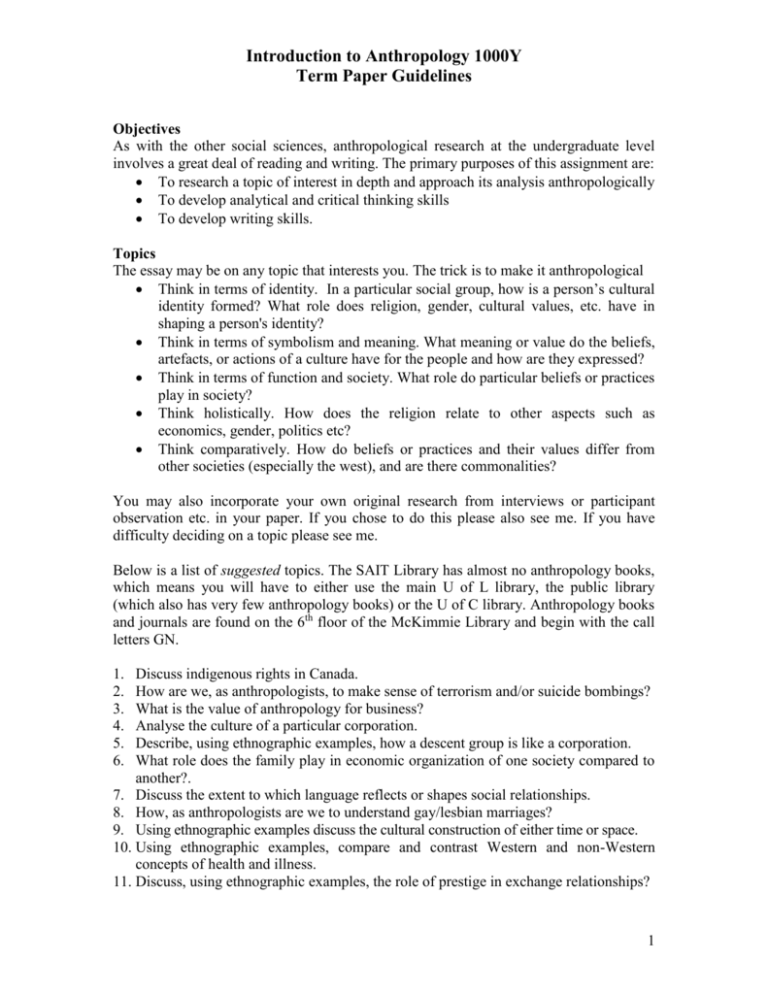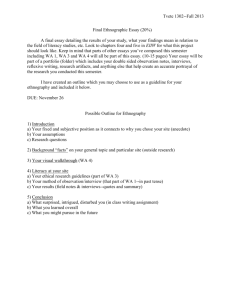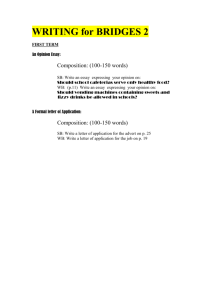term paper guidelines
advertisement

Introduction to Anthropology 1000Y Term Paper Guidelines Objectives As with the other social sciences, anthropological research at the undergraduate level involves a great deal of reading and writing. The primary purposes of this assignment are: To research a topic of interest in depth and approach its analysis anthropologically To develop analytical and critical thinking skills To develop writing skills. Topics The essay may be on any topic that interests you. The trick is to make it anthropological Think in terms of identity. In a particular social group, how is a person’s cultural identity formed? What role does religion, gender, cultural values, etc. have in shaping a person's identity? Think in terms of symbolism and meaning. What meaning or value do the beliefs, artefacts, or actions of a culture have for the people and how are they expressed? Think in terms of function and society. What role do particular beliefs or practices play in society? Think holistically. How does the religion relate to other aspects such as economics, gender, politics etc? Think comparatively. How do beliefs or practices and their values differ from other societies (especially the west), and are there commonalities? You may also incorporate your own original research from interviews or participant observation etc. in your paper. If you chose to do this please also see me. If you have difficulty deciding on a topic please see me. Below is a list of suggested topics. The SAIT Library has almost no anthropology books, which means you will have to either use the main U of L library, the public library (which also has very few anthropology books) or the U of C library. Anthropology books and journals are found on the 6th floor of the McKimmie Library and begin with the call letters GN. 1. 2. 3. 4. 5. 6. Discuss indigenous rights in Canada. How are we, as anthropologists, to make sense of terrorism and/or suicide bombings? What is the value of anthropology for business? Analyse the culture of a particular corporation. Describe, using ethnographic examples, how a descent group is like a corporation. What role does the family play in economic organization of one society compared to another?. 7. Discuss the extent to which language reflects or shapes social relationships. 8. How, as anthropologists are we to understand gay/lesbian marriages? 9. Using ethnographic examples discuss the cultural construction of either time or space. 10. Using ethnographic examples, compare and contrast Western and non-Western concepts of health and illness. 11. Discuss, using ethnographic examples, the role of prestige in exchange relationships? 1 12. What can the study of the patterns of food preparation, distribution and consumption tell us about the dynamics of social life? 13. In what ways is marriage economically important? Illustrate your answer with ethnographic examples. 14. Discuss relativism and ethnocentrism with respect to anthropological method and theory. 15. 'Witchcraft is irrational'. Discuss using ethnographic examples. Structure The essay must have a title that should encapsulate your main argument. The essay must have an introductory paragraph or section that outlines your major argument or thesis, as well as supporting hypotheses and evidence for the topic you have chosen. This should be as explicit as possible. Great emphasis in grading is placed on this section. It is often helpful to think in terms of a question the paper attempts to answer. The body of the text should build on the hypothesis by providing examples to support your argument, i.e. it must be both descriptive and analytical. Generally the body of the paper should be about two thirds descriptive and one-third analytical. Failure to be analytical, or failure to back up any assertions made, either by evidence or argument, will result in a lower grade. Some things to think about: What are the assumptions and biases of the authors you use? What are the implications of your topic for anthropology? The conclusion should summarize the results of your analysis (i.e. what you conclude not what you did). You may also discuss any new understandings or insights that you have arrived at from doing the essay. The concluding section is not a place to introduce new data. The essay must have a list of references used. References Note: “References “ refers to books and articles actually referred to in the essay. A “Bibliography”, on the other hand, is simply a list of books or articles that may or may not have been used. It is the former that is required. A minimum of 3, and a maximum of 10, scholarly references must be used. You must use the American Anthropological Association’s reference format for this paper. http://www.aaanet.org/pubs/style_guide.pdf In brief, for short direct quotes (less than 2-3 lines in length) and specific comments by your author(s), use the following form in the context of your paper: (Halifax 1979:6). For lengthy quotes, separate the quote from the body of text, single space, and indent it 5 spaces on either side. At the end of the paper, list the references that you have used in alphabetical order, giving the following type of Halifax, Joan, 1979. Shamanic Voices. New York: Arkana, Penguin Books Any of the books or articles used in the class may be used. Format 10-15 typed pages (2000-3000 words), double-spaced, 10-12-point font Pages should be numbered. The essay must have a cover page with your name and student number along with the title of the essay. 2 Pages must be stapled and not in a duo tang or other type of binder or folder. Alternatively, the paper may be submitted electronically in Word format. If you choose this method to submit your essay it must still adhere to the first three points above. If submitted this way, I will acknowledge receipt of the paper immediately and return it electronically after the due date with comments in red, and a mark. Evaluation All term papers are marked out of 20 and then factored to arrive at the final mark. The paper will be evaluated according to the following criteria: Grammar, spelling and punctuation – 20% Papers that are full of spelling or grammatical mistakes, or that are improperly punctuated may lose up to 20% of the mark for the paper. It is important, therefore, to not only spell check your essay, but also to proofread it before you submit it. If English is not your first language it is a good idea to have a friend proofread it. If you are unsure of grammar and punctuation I recommend the fourth edition of Strunk and White’s The Elements of Style. Strunk’s first edition is also available free at: http://sut1.sut.ac.th/strunk/ Clarity of structure and organization and style – 30% Is there a clear statement of the thesis or argument of the essay in the introductory section? Does the author follow through with the promises made in the introduction? Is the information presented in a logical, orderly fashion that can be readily understood? Does the report flow? Is the author familiar and comfortable with her/his subject? Does the student give the impression that she/he knows what she/he is talking about? Is it wordy? Does the conclusion neatly summarize the findings? Innovativeness and analytic interpretation – 50% Does the essay provide new insight into the chosen subject matter via carefully thought out consideration or does it come off as a simple "re-hash" of source materials? Do the illustrations or examples used actually illuminate the points stressed? Do the conclusions follow from the material and arguments presented. Is it too descriptive? Does the author make unsubstantiated claims or assertions? Due Date: Dec 1st Outlines or drafts may be handed in on or before November 17th and will be returned with comments and suggestions. Percent of Grade: 40% Things to do Frame your essay in terms of a question o How does Islam in Nigeria affect family life? o How do Wicca marriages compare with Christian marriages? o What role does kinship play in Dinka economics? And then answer the question Engage with your authors – i.e. discuss/mention/evaluate their ideas 3 o What are their assumptions and biases? o How did they collect their data? o Are their conclusions valid? o What do others have to say about their ideas? o What do you think about their ideas? o Are there alternative conclusions that could be arrived at Divide your paper into headed sections Proof read your essay before you submit it. Have someone else read it and comment on it. Things to avoid Being entirely descriptive Making unsubstantiated assertions Spending too much time on history Being wordy – see Strunk and White’s The Elements of Style o http://sut1.sut.ac.th/strunk First person. Use the third person instead. For example, instead of: I will look at how the Heaven’s Gate cult exemplifies the power of belief. Write: “This paper examines how Heaven’s Gate cult exemplifies the power of belief”. Plagiarism. Plagiarized essays will result in a grade of zero. Students may also be subject to additional University sanctions. If you are in doubt as to whether or not to reference err on the side of caution and provide a reference. 4









